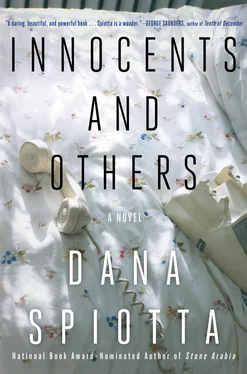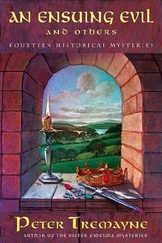Then it was my turn and I was at a bit of a loss. I thought about what I wanted to see. I told her to nonchalantly walk up to the edge of the pool and drop in, fully clothed and with no expression on her face.
“Really?” she said.
“That’s what I got,” I said. “Falls. Unexpected falls. That’s pretty much it.” Meadow laughed, but then she did the slowest and most serious deadpan walk to the edge of the pool. I filmed her, and she stood there in her white clothes, feet together on the lip of the pool. She was very still and expressionless. Then she began to sway. Gently at first, and then more widely but still expressionless until she keeled over like a felled tree into the water. I think I loved Meadow from that moment on.
After we had filmed for a couple of hours, Meadow promised to get the film developed so we could edit it the next week. “I don’t know how to edit,” I said.
“I will show you,” she said. “And you will show me what you know.” I had never worked with someone before. It was a revelation: I could share my peculiar view of the world with other people.
“I have made some videos,” I told her.
“Yeah?” she said, and put a stuffed olive in her mouth. We had unloaded from the refrigerator a bounty of fancy appetizers in plastic catering containers.
“My dad bought me a video camera for Christmas last year,” I said. “Yeah. So I made this goofy series of videos.”
“Like what?” Meadow said, really looking interested.
I started giggling.
“What?”
“It is very silly. I film my cat, Denton, doing his Denton stuff like chasing a string, looking out the window, walking — and I narrate his interior monologue.” This was how I spent my lonely weekends, aside from watching TV. I made these silly videos and I watched them.
“Really?” she said.
“It started like that. But then it got more elaborate. I put the camera on a tripod, point it at him, and then I read Sartre and Camus while he looks meaningfully out the window.” Meadow made an “ahh” sound and tilted her head. “It works even better if I read it in French. Denton speaks perfect French.”
“Of course he does.”
“Other times I film him but I play a song on my stereo, mostly musicals or opera. He stalks a moth or nothing really and we hear a song from Carmen. He likes songs from South Pacific too.” I took a big gulp of Tab. “I call it Denton’s Diaries. ”
“You are very funny,” Meadow said, like being funny was a diagnosis. “How many of these diaries exist?”
“Probably twenty? I watch them and that’s about it.”
“No editing and one shot, huh?”
I shrugged. “I just film it, stop if I need to switch angles. It’s just for a goof.”
“It isn’t really making a film until you edit. Otherwise it is like filming a skit.”
“Funny you should say that. I also used to make fake commercials.”
“With the video camera?”
“Yeah. I made a bunch of these. Directed by and starring me. With occasional guest turns from Denton. At first I tried to do takeoffs, like puns or Cracked magazine stuff. But then I realized that just exactly redoing the commercials with my found props and my pets was funnier. The more precisely I imitated and recited the words as they were, the funnier the videos turned out.”
“Interesting. I have to think about why that might be. It is odd what is funny, right?”
“Yeah, it really is.”
“So you like making things,” she said.
“Do you want me to show you sometime?” I said, swallowing my third perfect ball of mozzarella wrapped in red pepper.
“I don’t even need to see them. I know they are great,” she said and barked out a loud laugh.
We continued to eat in the kitchen, by ourselves, Meadow’s parents nowhere in sight. They had apparently gone out to dinner. I suppose that as different as we were, we shared an affinity for solitude, for making private worlds within the real world. All I know is that I was very comfortable with her and in her house. My mother picked me up shortly after, and on the ride home, I could not stop talking about Meadow.
When the developed film came back from the lab a week later, we watched our “raw” footage on Meadow’s projector. First my prat flip, then Meadow’s deadfall.
“It is funnier when you do it,” I said.
“Why do you think so?” she asked, looking puzzled.
“Because no one expects the glamorous skinny chick to do something goofy. But the chubby girl has to do something funny. I mean, why else are we looking at her, you know? If you are expecting it, not as funny.”
“I don’t know if that is true. You tell someone something is a comedy so they know it is okay to laugh. They expect it to be funny, and it is,” she said. I thought about that. Nodded.
“But yours is still funnier,” I said.
“You mean yours. I was only the actor; it was your film.” She was right, it was my film — the idea, the phrase, hadn’t ever occurred to me before. She taught me how to edit my film.
Our life together had begun.
* * *
Most days we hung out after school, almost entirely at Meadow’s house. Sometimes we made films, but more often we watched films. Meadow was already movie obsessed: we went to the revival art house theater, the Nuart, and watched whatever films they were showing. We went to Westwood Village and spent entire Saturdays seeing movies, going from one movie theater to another, watching everything that came out: blockbusters, teen films, war films, comedies. And as Hosney’s class opened a world of great older films to us, we also began to watch more obscure movies on video at Meadow’s house. Foreign films, black-and-white American films, silent films, documentaries, everything. And we watched what we loved over and over. What we discovered was that the more you saw of something good, the better it became. Being comprehensive also was important. When Meadow was on a James Cagney kick, we watched The Roaring Twenties, The Public Enemy, Angels with Dirty Faces, White Heat. Dialogue memorized, scenes recalled: we became our own insular world of reference and repetition. If you didn’t know the films, you didn’t know us.
We were best friends the way girls can sometimes be at that age. We wrote notes to each other. After we went to our respective homes, we would call each other on the phone and do our homework together. We made occasional movies as well, with Meadow’s Super 8 camera and then her 16 mm camera and with my video camera. We made epics and shorts and parodies. Then, at last, came Meadow’s sixteenth birthday, and her parents gave her a car. We were free to do as we pleased: drive to the beach, drive to the movies, and sometimes just drive.
We were different, even then. Meadow was very serious about seeing what she wanted to see, and she was always more obsessive than I was. I remember a Saturday in junior year. I wanted to see Fast Times at Ridgemont High. Again. (We had seen it the previous weekend.) She wanted to see something at the Nuart. My Little Loves by Jean Eustache.
“It is only playing one night,” she said. It mattered, in those days. Sometimes you had only one chance to see a film. A lot of films were not available on video yet. The night before, she had taken me to another film by the same director, The Mother and the Whore. In French with subtitles. Full of dialogue and long static shots in low-light black and white, which made it feel like a documentary, like a cinema verité film. Three and a half hours of Jean-Pierre Léaud chain-smoking with manic desperation. It felt very cool to me to see a French film about sexual despair when I had yet to have had any sex at all. In the end, I was glad I had seen it, but I was not eager for more.
Читать дальше












